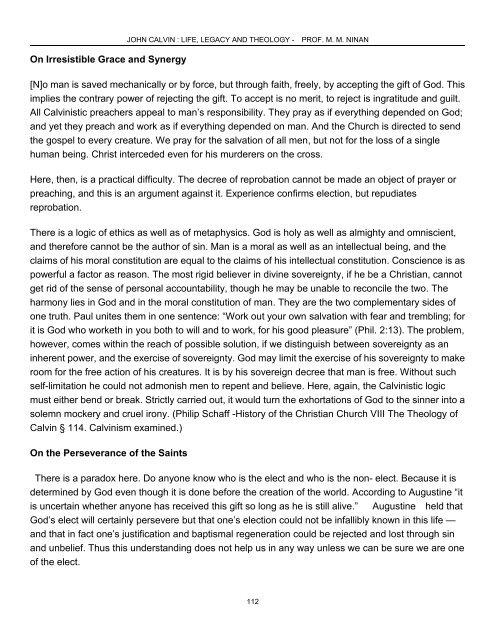You also want an ePaper? Increase the reach of your titles
YUMPU automatically turns print PDFs into web optimized ePapers that Google loves.
JOHN CALVIN : LIFE, LEGACY AND THEOLOGY -<br />
PROF. M. M. NINAN<br />
On Irresistible Grace <strong>and</strong> Synergy<br />
[N]o man is saved mechanically or by force, but through faith, freely, by accepting the gift of God. This<br />
implies the contrary power of rejecting the gift. To accept is no merit, to reject is ingratitude <strong>and</strong> guilt.<br />
All <strong>Calvin</strong>istic preachers appeal to man’s responsibility. They pray as if everything depended on God;<br />
<strong>and</strong> yet they preach <strong>and</strong> work as if everything depended on man. And the Church is directed to send<br />
the gospel to every creature. We pray for the salvation of all men, but not for the loss of a single<br />
human being. Christ interceded even for his murderers on the cross.<br />
Here, then, is a practical difficulty. The decree of reprobation cannot be made an object of prayer or<br />
preaching, <strong>and</strong> this is an argument against it. Experience confirms election, but repudiates<br />
reprobation.<br />
There is a logic of ethics as well as of metaphysics. God is holy as well as almighty <strong>and</strong> omniscient,<br />
<strong>and</strong> therefore cannot be the author of sin. Man is a moral as well as an intellectual being, <strong>and</strong> the<br />
claims of his moral constitution are equal to the claims of his intellectual constitution. Conscience is as<br />
powerful a factor as reason. The most rigid believer in divine sovereignty, if he be a Christian, cannot<br />
get rid of the sense of personal accountability, though he may be unable to reconcile the two. The<br />
harmony lies in God <strong>and</strong> in the moral constitution of man. They are the two complementary sides of<br />
one truth. Paul unites them in one sentence: “Work out your own salvation with fear <strong>and</strong> trembling; for<br />
it is God who worketh in you both to will <strong>and</strong> to work, for his good pleasure” (Phil. 2:13). The problem,<br />
however, comes within the reach of possible solution, if we distinguish between sovereignty as an<br />
inherent power, <strong>and</strong> the exercise of sovereignty. God may limit the exercise of his sovereignty to make<br />
room for the free action of his creatures. It is by his sovereign decree that man is free. Without such<br />
self-limitation he could not admonish men to repent <strong>and</strong> believe. Here, again, the <strong>Calvin</strong>istic logic<br />
must either bend or break. Strictly carried out, it would turn the exhortations of God to the sinner into a<br />
solemn mockery <strong>and</strong> cruel irony. (Philip Schaff -History of the Christian Church VIII The <strong>Theology</strong> of<br />
<strong>Calvin</strong> § 114. <strong>Calvin</strong>ism examined.)<br />
On the Perseverance of the Saints<br />
There is a paradox here. Do anyone know who is the elect <strong>and</strong> who is the non- elect. Because it is<br />
determined by God even though it is done before the creation of the world. According to Augustine “it<br />
is uncertain whether anyone has received this gift so long as he is still alive.” Augustine held that<br />
God’s elect will certainly persevere but that one’s election could not be infallibly known in this life —<br />
<strong>and</strong> that in fact one’s justification <strong>and</strong> baptismal regeneration could be rejected <strong>and</strong> lost through sin<br />
<strong>and</strong> unbelief. Thus this underst<strong>and</strong>ing does not help us in any way unless we can be sure we are one<br />
of the elect.<br />
112

















